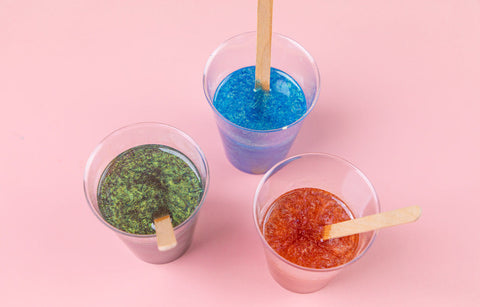Epoxy Vs Resin: Choosing the Right Material for Your Project

When it comes to epoxy and resin, you might think they're like two peas in a pod. But hold your paintbrush, my friend, because there are actually some pretty important differences between the two. In this article, we're going to dive into the nitty-gritty of epoxy vs. resin, exploring their uses, advantages, and disadvantages. So buckle up, grab your safety goggles, and let's get cracking!

What is Epoxy?
Alrighty, let's start with epoxy. Picture this: it's like a fancy adhesive brought to life with a little chemistry magic. Epoxy is made by mixing resin (which is often made from a compound called bisphenol-A or BPA) with a hardener, like polyamine. When these two teammates get together, they form a super-strong, rock-hard polymer. Think Hulk-level strength, but in the world of adhesives.
Uses of Epoxy:
Epoxy is a versatile beast that struts its stuff in various fields. Here are a few places you might find it flexing its muscles:
- Construction: Epoxy is the trusted sidekick of builders everywhere. It's perfect for bonding concrete, filling pesky cracks, and creating surfaces that can withstand a Godzilla-level beating.
- Flooring: Want to make your floors shine like they've had a beauty makeover? Epoxy coatings and finishes will do the trick. They'll give you a glossy, durable, and easy-to clean surface that'll make your guests ooh and aah.
- Art and Crafts: Epoxy resin is an artist's best friend. It's what they use to create those masterpiece-worthy finishes on paintings, exquisite jewelry, and stunning tabletops. If you want something glossy and eye-catching, epoxy's got your back.
- Boat Building: Ahoy, mateys! Epoxy is a seafarer's dream come true. Its waterproof and adhesive properties make it a must-have when it comes to building boats that can face the wrath of the ocean.
Advantages of Epoxy:
Epoxy's got a lot going for it, and that's why people love it like a box of chocolates. Here are a few of its standout qualities:
- Strength and Durability: We're talking Hercules-level strength here. Epoxy is known for being tougher than nails, making it a go-to for projects that need to stand the test of time.
- Chemical Resistance: When it comes to battling harsh chemicals like oil, gasoline, and even those pesky household cleaners, epoxy ain't afraid. It's like a superhero with a shield of resistance.
- Versatility: Epoxy isn't boring, oh no. It can be jazzed up with tints, pigments, or cool additives to create all sorts of unique finishes and effects. Talk about versatility!
- Adhesion Superpowers: Epoxy knows how to stick around. It bonds like a champ with different materials, be it metals, concrete, or wood. It's like the Velcro of the adhesive world.
Disadvantages of Epoxy:
Before we paint a rosy picture, let's take a look at some of the not-so-superhero qualities of epoxy:
- Pot Life Crunch Time: Be warned, my friend, epoxy isn't the laid-back type. It has a short pot life, which means you gotta mix it and use it pronto. Leave it sitting on the shelf, and it'll harden up like a grumpy old man.
- Toxicity Alert: Some types of epoxy resins contain toxic ingredients, like our not-so-friendly friend BPA. So, it's important to stay safe and use proper ventilation when working with epoxy. Safety goggles and a cape wouldn't hurt either.
What is Resin?
Alright, now let's turn our attention to resin. Resin is a fancy-sounding word, but really, it's just a thick substance that can either come from plants or be man-made. Think of it as the chameleon of materials - it can be epoxy resin or different types, like polyester, polyurethane, or even silicone. Resin is all about casting, coating, and sealing, making it a perfect choice for creative peeps in need of a little magic.
Uses of Resin:
Ready to get your creative juices flowing? Here are a few ways you can put resin to good use:
- Casting: Resin is the go-to material for creating intricate shapes. Whether you're making jewelry, figurines, or even prototypes, resin's got your back. It's like a molding master!
- Coatings: Want a glossy, protective layer for your artwork or that brand-new tabletop? Resin's got you covered. Literally. It'll give your stuff that shiny, professional finish that screams "look at me, I'm fantastic!"
- Jewelry Making: Break out your crafting supplies because resin is essential in the world of jewelry. You can encapsulate all sorts of cool objects - pendants, flowers, beads, even that tiny seashell you brought back from your last beach vacation. Talk about wearing memories!
- Electronics: Resin occasionally moonlights as an electrical insulator. It's like a superhero that keeps those pesky electrical currents in check. Safety first, my friend!
Advantages of Resin:
Resin may not flex its muscles as much as epoxy, but it's got its own set of cool qualities. Here's what makes it shine:
- Clarity that Wins Hearts: If you're all about that see-through vibe, resin is your soulmate. It gives you that crystal-clear transparency, perfect for casting projects that need to show off what's inside.
- Time to Play: Unlike epoxy, resin gives you more time to work your magic. It has a longer pot life, so you can take your sweet time before it decides to harden on you. No need to rush - it's like the friend who's always fashionably late.
- All Hail Non-Toxic Options: The world is changing, my friend, and so is resin. Nowadays, you can find non-toxic and low-VOC resin options that won't give you a headache. Safety first!
- Friendly to Wallets: Here's a little secret: resin won't make your wallet cry. It's generally more affordable than epoxy, making it a popular choice for all you budget-conscious crafters out there.
Disadvantages of Resin:
Resin may be cool, but it's not without its quirks. Here are a few things to keep in mind:
- A Brittle Reality: Brace yourself for a bit of truth, my friend - resin can be brittle. That means it's more prone to cracks and fractures. Handle it with care, and it'll love you back!
- Let's Talk UV: Some resins might not be too keen on hanging out in the sunlight. You might notice a bit of yellowing or degradation over time if they're not protected from those UV rays. Time to grab a hat and some sunscreen for your resin masterpieces!
- Chemical Resistance, Chill Out: Don't look at resin for those heavy-duty chemical battles. It might not have the same resistance as epoxy, which means certain applications might not be its strong suit. Sorry, resin, you tried!
Conclusion:
There you have it - the down-to-earth, no-nonsense lowdown on epoxy vs. resin. Both have their quirks, advantages, and disadvantages. Epoxy brings strength, durability, and chemical resistance to the table, while resin offers clarity, longer working times, and affordability. So, whether you're tackling a construction project, getting creative with art, or casting stunning jewelry, now you have the knowledge to pick the perfect material for your masterpiece. Remember, when it comes to epoxy vs. resin, choose the one that suits your needs and gets your creative juices flowing. Happy crafting, my friend!
FAQs:
-
Can epoxy and resin be used interchangeably?
While epoxy and resin are similar in some ways, they are not always interchangeable. Epoxy is known for its strength and durability, making it suitable for heavy-duty applications like construction and boat building. Resin, on the other hand, is often used for casting, coating, and sealing projects where clarity and aesthetics are important. So, depending on the specific project requirements, you may need to choose between epoxy and resin. -
Are epoxy and resin safe to use?
Epoxy and resin can contain potentially toxic components, such as BPA or volatile organic compounds (VOCs). It is crucial to use proper ventilation and safety precautions when working with these materials. It's advisable to wear gloves, safety goggles, and work in a well-ventilated area or wear a respirator. Additionally, always read and follow the manufacturer's safety guidelines and instructions. -
Can epoxy and resin be colored?
Yes, both epoxy and resin can be colored using various pigments, dyes, or additives. This allows for endless possibilities and creative freedom in achieving the desired look for your projects. Just make sure to use colorants specifically designed for epoxy or resin, as regular paints or colorants may not react well with these materials. -
How long does epoxy or resin take to cure?
The curing time of epoxy and resin can vary depending on the specific product, temperature, humidity, and thickness of the application. Generally, epoxy can take anywhere from a few hours to several days to fully cure, while resin may take 24 to 48 hours or longer. It's essential to follow the manufacturer's instructions regarding curing time and temperature for optimal results. -
Can epoxy or resin be used outdoors?
Epoxy is often more suitable for outdoor applications due to its superior durability and resistance to the elements, UV radiation, and moisture. Resin, especially certain types like polyester resin, may yellow or degrade when exposed to UV light over time. However, there are UV-resistant resin options available that can withstand outdoor conditions. Always check the product specifications and choose the appropriate material for your specific outdoor project. -
Can epoxy or resin be sanded and polished?
Yes, both epoxy and resin can be sanded and polished to achieve a smooth and glossy finish. However, it's important to note that epoxy is generally harder and may require more effort during the sanding and polishing process. Resin, being relatively softer, can be more forgiving in terms of ease of sanding and achieving a polished surface. Take care and follow proper sanding and polishing techniques to avoid any damage to your project. -
Are epoxy and resin food-safe?
Not all epoxy and resin products are food-safe. Some epoxy and resin formulations are specifically labeled as food-safe, but it's important to check the manufacturer's instructions and certifications before using them for food-related applications. If you intend to use epoxy or resin for food preparation surfaces or dining tables, opt for products that explicitly state their food-safe properties.
Remember, when in doubt, always consult the manufacturer or seek professional advice for specific questions and concerns regarding your unique project.



Leave a comment